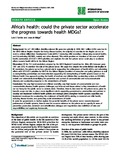Africa's health: could the private sector accelerate the progress towards health MDGs?
Abstract
Out of 1.484 billion disability-adjusted life years lost globally in 2008, 369.1 million (25%) were lost in the WHO African Region. Despite the heavy disease burden, the majority of countries in the Region are not on track to achieve Millennium Development Goals (MDG) 4 (reducing child mortality), 5 (improving maternal health), and 6 (combating HIV/AIDS, malaria and other diseases). This article provides an overview of the state of public health, summarizes 2010-2015 WHO priorities, and explores the role that private sector could play to accelerate efforts towards health MDGs in the African Region.Of the 752 total resolutions adopted by the WHO Regional Committee for Africa (RC) between years 1951 and 2010, 45 mention the role of the private sector. We argue that despite the rather limited role implied in RC resolutions, the private sector has a pivotal role in supporting the achievement of health MDGs, and articulating efforts with 2010-2015 priorities for WHO in the African Region: provision of normative and policy guidance as well as strengthening partnerships and harmonization; supporting the strengthening of health systems based on the Primary Health Care approach; putting the health of mothers and children first; accelerating actions on HIV/AIDS, malaria and tuberculosis; intensifying the prevention and control of communicable and noncommunicable diseases; and accelerating response to the determinants of health.
The very high maternal and children mortality, very high burden of communicable and non-communicable diseases, health systems challenges, and inter-sectoral issues related to key determinants of health are too heavy for the public sector to address alone. Therefore, there is clear need for the private sector, given its breadth, scope and size, to play a more significant role in supporting governments, communities and partners to develop and implement national health policies and strategic plans; strengthen health systems capacities; and implement roadmaps for accelerating the attainment of health MDGs relating to maternal and child health, reducing disease burden, and promoting social determinants of health.
In order for governments to further explore the potential benefits of the private sector towards improved performance of health systems, there is need for accurate evidence on the private sector capacity in areas of prevention, promotion, treatment and rehabilitation; dialogue and negotiation; clear definition of roles and responsibilities; and regulatory frameworks.

